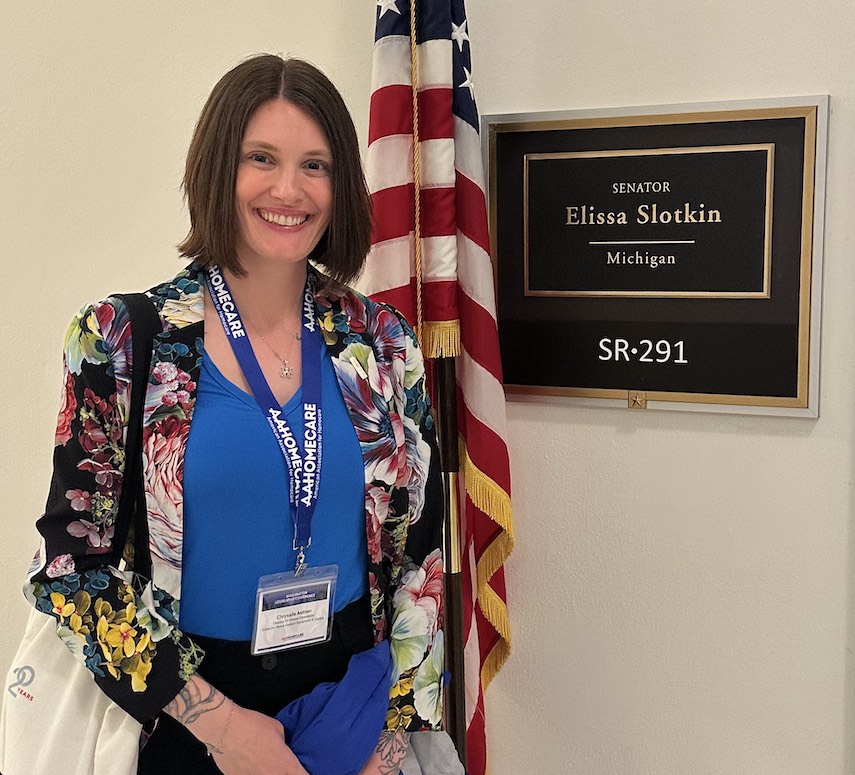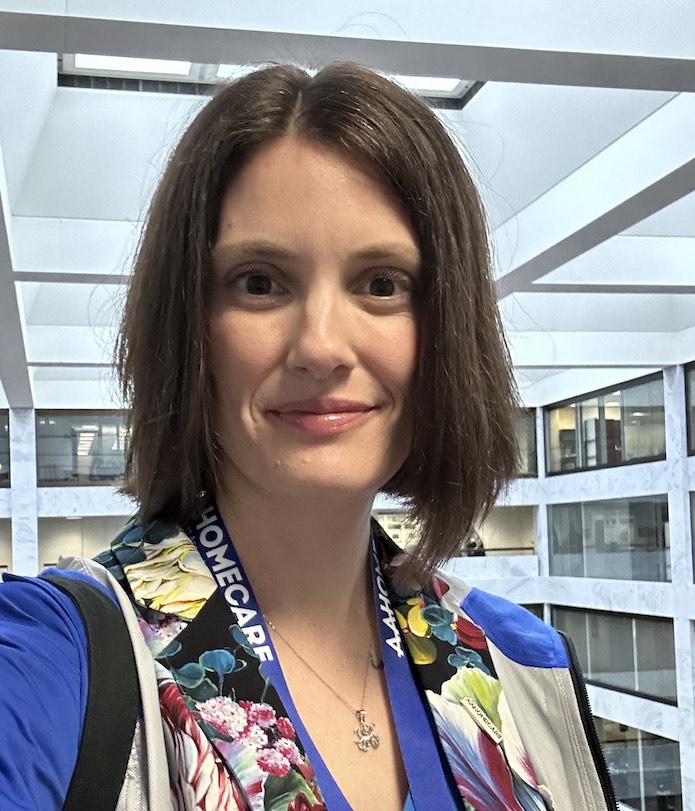GRAND RAPIDS, MI – It’s one thing to have a successful career, but a career that makes a difference in the lives of patients takes a bit more effort. Chrysalis Ashton, RRT (pictured) has spent her career helping patients, first as a hospital respiratory therapist and now as director of Clinical Operations at CareLinc Medical Equipment & Supply, Grand Rapids, Mich., a regional DME with more than 20 locations in Michigan and additional operations in Ohio, North Carolina, South Carolina, and Georgia.
Looking to broaden her impact, the 38-year-old Ashton began to seriously look for opportunities to advocate for the DME industry and its patients. A trip to Washington, D.C. on behalf of the COPD Foundation lit the fire, and those flames were fanned during AAHomecare’s recent Washington Legislative Conference (WLC).
Medtrade Monday sat down with Ashton to learn more about her recent trip to DC, as well as what inspires her to spend the time, money, and effort to communicate with legislators on behalf of the DME industry and its patients.
 Medtrade Monday: How did the AAHomecare WLC go?
Medtrade Monday: How did the AAHomecare WLC go?
Ashton: It was an amazing experience, very similar to the COPD Foundation trip in that it lights me up. I love the feeling that I get from telling my story and advocating for patients and the industry that I love.
Medtrade Monday: How receptive were legislative aids and members of Congress?
Ashton: It was somewhat variable. The biggest ask, of course, was the 75/25 Medicare reimbursement relief. Some of them were very open to it. Many of them didn’t quite understand what it was, so we explained what it meant, what competitive bidding is, why this is important—and how it affects patient access to needed equipment and services.
The overall level of receptivity was neutral. In the political climate that we are in, cost savings is a huge topic—particularly with the spending bill and everything that’s currently rolling around. It felt a little bit touchy in certain areas, but we were definitely welcomed and listened to. All of the aids that we spoke with took lots of notes and took our materials. They asked really great questions and they were very professional in our interactions.
Medtrade Monday: Was there a specific legislative office that stood out?
Ashton: The legislative aid for the office of Rep. Hillary J. Scholten (D-Mich) was very interested in the NIV NCD [non-invasive ventilation national coverage determination] proposal that CMS put out a few months ago that we’re still waiting on for a final determination. As we all know in our industry, it’s pretty controversial. We have a lot of concerns as an industry about how this might affect our businesses and also how it will affect patient access to NIV therapy.
She was very open to putting in a word to CMS. She expressed that it seemed like a very simple problem to fix—that CMS could just retract it, revise it, get more industry support and buy-in before re-releasing it. We were pretty clear that this was something that was needed, but that it had some flaws so it needed to be revised quite extensively before it would be appropriate. Her office and her legislative aid were very interested in helping.
Medtrade Monday: How concerned are you about possible Medicaid cuts?
Ashton: I’m pretty concerned. It’s not looking great. My concern is more for the patient population, because we already service a very large percentage of Medicaid patients. Many of them could potentially lose access to the equipment and supplies that we provide because their benefits will be discontinued or reduced. There’s also concern in the industry about cuts to reimbursement on some items, which unfortunately get targeted. The equipment, supplies, and services we provide every day are life-sustaining. I hate to see anyone lose the ability to access those.
 Medtrade Monday: Why did you decide to get involved with advocacy?
Medtrade Monday: Why did you decide to get involved with advocacy?
Chrysalis Ashton: Last year I started looking at advocacy opportunities. I’ve always wanted to be in a profession where I feel like I’m making a difference and this felt like something that I could actually do to help make a difference.
Earlier this year I had the opportunity to do a fly-in with the COPD Foundation, a cause that’s near and dear to my heart. We take care of many COPD patients in our DME world, and I also have a family history of COPD. That was an amazing experience, just being with like-minded individuals and talking with the legislative offices and telling our stories—and getting their buy-in, because that was the goal. It lit my soul on fire.
I was so energized after coming back from that, and when I returned I did a presentation for our executive advisory committee. I was enthusiastic about my experience and about how it could benefit our company and our patients to do more advocacy. AAHomecare came up again because they do their legislative conference every year. I requested to go to this one because I didn’t make it last year. I wanted to continue that feeling of making a difference and physically going somewhere—talking to live individuals—rather than just sending e-mails or phone calls to my representatives and senators.
Medtrade Monday: What would you say to providers who are on the fence about getting involved?
Ashton: Take the chance. You don’t really realize how much of an impact you can make unless you actually get out there. It’s easy to get stuck in our ruts and the day-to-day grind. Advocating for causes that are near and dear to me is fulfilling in a personal sense, but it also makes my job exciting. I feel proud to advocate for patients, the company I work for, and the industry. Even if you feel like you don’t have the time and energy, reach out to organizations like AAHomecare and ask how you can get involved. It’s definitely worth it once you get started.
Medtrade Monday: What’s your level of optimism at this point?
Ashton: Being relatively new to this, I’m trying to stay on the side of optimism, but there are times when I feel like neutral is the best I can do. It is a pretty volatile environment right now, with a lot of unknowns and a lot of changes to the [federal] budget with cutting and rearranging. Seeing what has happened in the past with competitive bidding and reimbursement reductions across our industry—it is scary. I did feel a pretty good sense when I’ve been in Washington the last couple of times that there is concern and care about our industry. Nobody wants Americans to not be able to get the healthcare services and equipment that they need.

